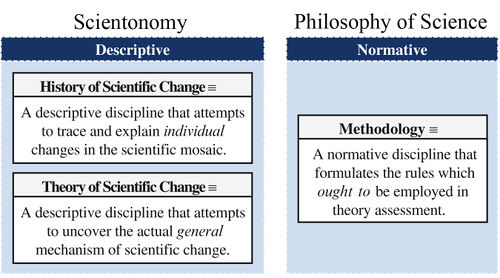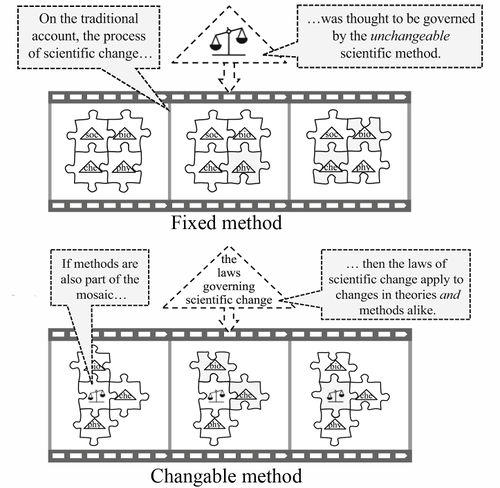Difference between revisions of "Scientonomy (Barseghyan-2015)"
| Line 9: | Line 9: | ||
===The Scope of Scientonomy=== | ===The Scope of Scientonomy=== | ||
====The field of scientonomy==== | ====The field of scientonomy==== | ||
| − | |||
The term scientonomy refers to the newly emerging ''science of science''. If science is considered the systematic study of the natural universe, then the science of science is the systematic study of the social and cognitive processes that scientists use to undertake this study, as evidenced by what they write and say. It is generally accepted nowadays that the body of theories accepted by a scientific community, and the methods employed to evaluate them, change over time. As the empirical scientific study of this process of scientific change, scientonomy aims at providing a new approach to developing a naturalistic account of how individuals and communities acquire knowledge. It differs from related fields of inquiry, such as history of science or the sociology of scientific knowledge, in that it maintains that the process of scientific change, despite its varied guises, exhibits certain general patterns. It attempt to study and document those patterns by giving them precise formulations. As in any other field of empirical science, the findings of scientonomy are inevitably fallible and are open to modification by the scientonomic community in the light of new evidence. | The term scientonomy refers to the newly emerging ''science of science''. If science is considered the systematic study of the natural universe, then the science of science is the systematic study of the social and cognitive processes that scientists use to undertake this study, as evidenced by what they write and say. It is generally accepted nowadays that the body of theories accepted by a scientific community, and the methods employed to evaluate them, change over time. As the empirical scientific study of this process of scientific change, scientonomy aims at providing a new approach to developing a naturalistic account of how individuals and communities acquire knowledge. It differs from related fields of inquiry, such as history of science or the sociology of scientific knowledge, in that it maintains that the process of scientific change, despite its varied guises, exhibits certain general patterns. It attempt to study and document those patterns by giving them precise formulations. As in any other field of empirical science, the findings of scientonomy are inevitably fallible and are open to modification by the scientonomic community in the light of new evidence. | ||
Revision as of 17:24, 11 September 2018
This is a definition of Scientonomy that states "A descriptive discipline that attempts to uncover the actual general mechanism of scientific change."
This definition of Scientonomy was formulated by Hakob Barseghyan in 2015.1 It is currently accepted by Scientonomy community as the best available definition of the term.
Contents
Scientonomic History
Acceptance Record
| Community | Accepted From | Acceptance Indicators | Still Accepted | Accepted Until | Rejection Indicators |
|---|---|---|---|---|---|
| Scientonomy | 1 January 2016 | The definition became de facto accepted by the community at that time together with the whole theory of scientific change. | Yes |
Question Answered
Scientonomy (Barseghyan-2015) is an attempt to answer the following question: What is scientonomy? How should it be defined?
See Scientonomy for more details.
Description
Scientonomy is defined as an academic discipline that aims to describe and explain the process of scientific change. While still very much in the process of inception, it is conceived to have two major branches - theoretical scientonomy and observational scientonomy. Theoretical scientonomy attempts to uncover the axioms and theorems that guide the process of scientific change. Observational scientonomy attempts to trace and explain historical and contemporary instances of scientific change.
The Scope of Scientonomy
The field of scientonomy
The term scientonomy refers to the newly emerging science of science. If science is considered the systematic study of the natural universe, then the science of science is the systematic study of the social and cognitive processes that scientists use to undertake this study, as evidenced by what they write and say. It is generally accepted nowadays that the body of theories accepted by a scientific community, and the methods employed to evaluate them, change over time. As the empirical scientific study of this process of scientific change, scientonomy aims at providing a new approach to developing a naturalistic account of how individuals and communities acquire knowledge. It differs from related fields of inquiry, such as history of science or the sociology of scientific knowledge, in that it maintains that the process of scientific change, despite its varied guises, exhibits certain general patterns. It attempt to study and document those patterns by giving them precise formulations. As in any other field of empirical science, the findings of scientonomy are inevitably fallible and are open to modification by the scientonomic community in the light of new evidence.
The basis for this newly emerging field is Barsegyhan's theory of scientific change as propounded in his 2015 book, The Laws of Scientific Change.1 It builds on the ideas of Kuhn, Lakatos, Laudan, and others, all of which can be considered precursors of scientonomy. The field of scientonomy, given its distinctive concern for both general theory and the explanation of historical particulars has two branches. First, it has a theoretical branch that attempts to uncover the general mechanism of scientific change. Secondly, it has an observational branch that attempts to trace and explain individual changes in the mosaic of theories accepted by a scientific community.1pp. 72-80
Theoretical scientonomy
Though highly relevant to the traditional field of philosophy of science, theoretical scientonomy differs from it in that, as a descriptive scientific field, it does not include the normative question of how science should be conducted so as to produce reliable knowledge. In the past, when a unitary and fixed scientific method was believed to exist, the descriptive question of how scientific change processes actually work was often conflated with the normative question of how they should work if reliable knowledge is to be produced. Scientonomy seeks a clear distinction between the two, and claims only the former as its subject matter.1pp. 12-20 This restriction is motivated by the same concerns as Bloor's symmetry postulate in the sociology of scientific knowledge.2 Scientonomy's descriptive account, however, does include the descriptive study of normative propositions espoused by scientific practitioners such as those contained in their avowed methodologies, and codes of ethics.3 Theoretical scientonomy concerns itself specifically with the identification of general principles of scientific change useful to a descriptive account of that process. The search for fixed general laws obviates the charge of incoherent relativism sometimes leveled at the sociology of scientific knowledge.4 By seeking such laws, it hopes to illuminate questions such as the nature of scientific rationality, and the naturalistic epistemological question of how knowledge has been acquired.
Observational scientonomy
Observational scientonomy differs from the current history of science discipline in significant ways. History of science currently lacks a guiding theory. It often focuses on the level of individual scientists, their work, and their social context, rather than on scientific communities. By contrast, Scientonomy focuses on theory-driven investigations of scientific communities, since it is at the community level that general principles of scientific change are evident. It seeks to confront the theory of scientific change with evidence that may force its alteration or refinement, and to apply it to an expanding range of particular cases, thereby enhancing our general understanding of the processes of scientific change.
Scientonomy vs. Particularism
Scientonomy and the lack of a universal scientific method
The approach of scientonomy contrasts with that of the particularism favored by some historians, social scientists, and philosophers. Particularism holds that the process of scientific change does not possess the sort of regularities that would render it amenable to any general theory. Its proponents typically make the tacit assumption that in order for a general mechanism of scientific change to exist, there must be a universal and unchanging method of science.1pp. xi-xvi, 81-97 Historical evidence now clearly indicates that the methods used by scientists to assess new theories have altered radically over time and between communities. For example, the Aristotelian-medieval method held that a scientific theory should be a set of axioms from which other propositions may be deduced. The axioms should be intuitive in the sense that any person with sufficient experience with the subject should be able to appreciate them.1pp. 143-144 Modern physicists would instead maintain that a theory must make novel predictions that are confirmed by observation and experiment.1p. 145 Scientonomy accepts the evidence that scientific methods have changed over time and differ between communities, but rejects the implication that this renders a theory of scientific change impossible. Instead, it supposes that changes in both theory and method obey a certain set of laws. It is these laws and not the methods of science, that scientonomy takes to be fixed.1pp. 82-835pp. 33-41
The individual and the group
Individual scientists differ one from another in their goals, desires, and criteria for theory appraisal. This too might seem to be grounds for rejecting the possibility of a general theory of scientific change. But the decisions to accept new theories, or to employ new methods, are made collectively by scientific communities rather than by individuals acting alone. Such communities have emergent properties and behaviors that cannot be understood solely in terms of the properties which their members possess separately. Scientonomy supposes that the general regularities it seeks are to be found at the level of whole scientific communities, rather than with the unruly particulars of the work of individual scientists. It thus focuses its investigations at that level.1pp. 43-52
The apparent lack of general features in science
The particularist claim that science appears to possess no general features that have remained fixed through history is not grounds for dismissing the possibility of a theory of scientific change. Theories often reveal that unexpected regularities underlie seemingly disparate phenomena. On the face of it, a point of light revolving in the heavens and a falling apple seem to have nothing whatsoever in common. Newton’s theory of Universal Gravitation asserted, however, that both are movements under the influence of a gravitational force. The theory was highly successful in accounting for both falling bodies and the movements of the planets using a small set of simple general principles. The similarities between the two classes of phenomena only became evident through the formulation of the theory. Success in theory formulation often depends on the ability to identify such unexpected connections.1p. 86
Reasons
No reasons are indicated for this definition.
If a reason supporting this definition is missing, please add it here.
Questions About This Definition
There are no higher-order questions concerning this definition.
If a question about this definition is missing, please add it here.
References
- a b c d e f g h i j Barseghyan, Hakob. (2015) The Laws of Scientific Change. Springer.
- ^ Golinski, Jan. (1998) Making Natural Knowledge: Constructivism and the History of Science. Cambridge University Press.
- ^ Sebastien, Zoe. (2016) The Status of Normative Propositions in the Theory of Scientific Change. Scientonomy 1, 1-9. Retrieved from https://www.scientojournal.com/index.php/scientonomy/article/view/26947.
- ^ Siegel, Harvey. (2011) Relativism, Incoherence, and the Strong Program. In Schantz and Seidel (Eds.) (2011).
- ^ Laudan, Larry. (1984) Science and Values. University of California Press.



